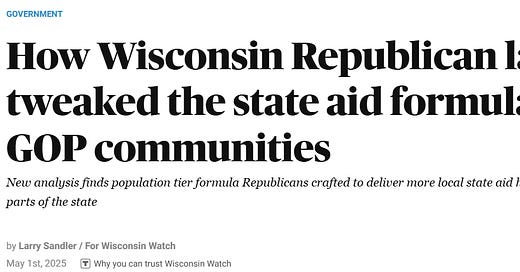When I ran for State Assembly, I campaigned on three issues: protect our democracy, restore our rights, and invest in our communities.
On Inauguration Day, a Republican colleague who, like me, has a local government background, said to me: “Are we gonna fix shared revenue?” Surprisingly, he was asking if we’re going to help local governments climb out of their fiscal challenges.
For years, Republicans have been starving local governments of a proper increase in vital aid. As the cost of services increased due to demand in growing communities like those I represent and inflation took off, there was not a proper increase in funding from the state. Republicans previously capped local governments’ ability to raise property taxes with “levy limits.” The only way to go above those limits is by asking voters to approve referendums.
Wisconsin helps fund our local governments through an appropriations process known as “shared revenue.” The use of this funding is generally unrestricted, and is generally tied to population.
As a former City Council member in Verona and Dane County Board member, I’m very familiar with the impact shared revenue has on our local communities. Municipalities get their funding through two primary sources: property taxes and shared revenue.
That Republican asking me that question gave me some hope about making investments in our communities.
After a lot of discussions, Assembly Republicans and Governor Evers struck a deal to provide an increase in the amount of shared revenue funding provided to local governments. They boosted state funding for all counties, cities, villages, and towns. Just like Republicans in the Legislature gerrymandered legislative maps for years, they rigged this new formula in their favor too. This time it was to get communities who vote for Republicans more tax dollars. I was really struck by this headline:
The increase of shared revenue was a good thing for local governments, however, the problem with the shared revenue deal was with the unfair distribution and strings attached to local governments.
The bill attached numerous unnecessary policy strings to the funding that restricted or eliminated local control, disproportionately impacted communities of color, restricted public health officials, diminished environmental stewardship, and limited local diversity efforts.
During those shared revenue negotiations, both the City and County of Milwaukee were about to fall off a fiscal cliff due to levy limits, a lack of shared revenue funding, and a pension crisis. That was the main driver behind the negotiations, and I didn’t think the bill gave either the City or County a clearly viable path to fiscal stability.
So I voted against it.
I feel even better about that vote, given the new study showing that Republicans provided a disproportionate increase in funding to municipalities that vote for Republicans. Funding local governments should be free of partisanship. Sadly, Republicans didn’t think that. A lousy, unfair, inequitable result.
According to Wisconsin Watch:
“On average, each percentage point of GOP vote share corresponds to a 2.1% increase in shared revenue”
Not one bit surprising to me.
I wonder what that Republican who asked me about shared revenue thinks of this particular result, so I’m going to ask him next time I see him! What do you think?
Going forward, communities should never have to rely only on referendums to try to meet their needs while the state sits on a budget surplus. We still need to fix shared revenue. I support former Representative Conley’s proposal to create a shared revenue advisory council to study shared revenue and submit its recommendations to the Legislature. This could start the process of fixing shared revenue to make it work for all areas equitably, not based on which way they vote.





While I understand that politicians have different approaches to solving community issues, I will never understand why our local leaders don't ask a few simple questions of their policies and those who lobby:
1. How will this elevate the quality of life for this group of people?
2. If this doesn't elevate the quality of life, how will it maintain the quality of life for this group of people?
3. Who benefits more from this policy? The policy-makers or the policy recipients?
4. Who makes the most money from this policy? Follow the money
Glad to see shared revenue finally increased, but the way it was distributed misses the mark. We need a nonpartisan formula based on need, not voting patterns. Local governments deserve flexible funding, real autonomy, and a stable, fair structure going forward. The proposed advisory council is a good start, but we need deeper reform to rebuild trust and equity across all communities.